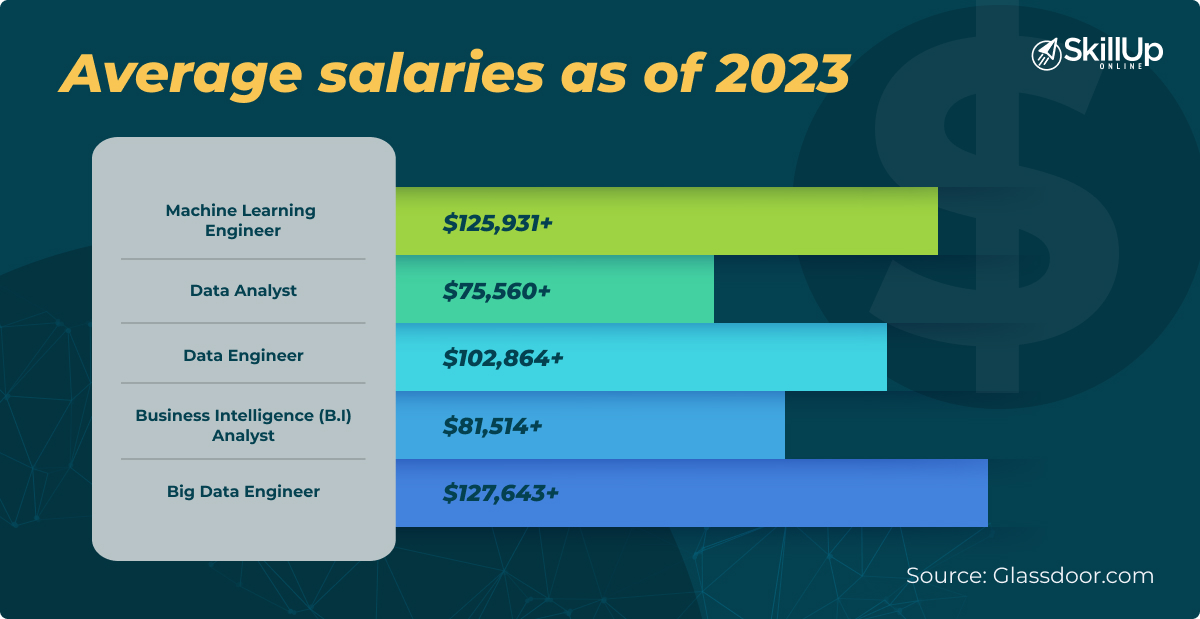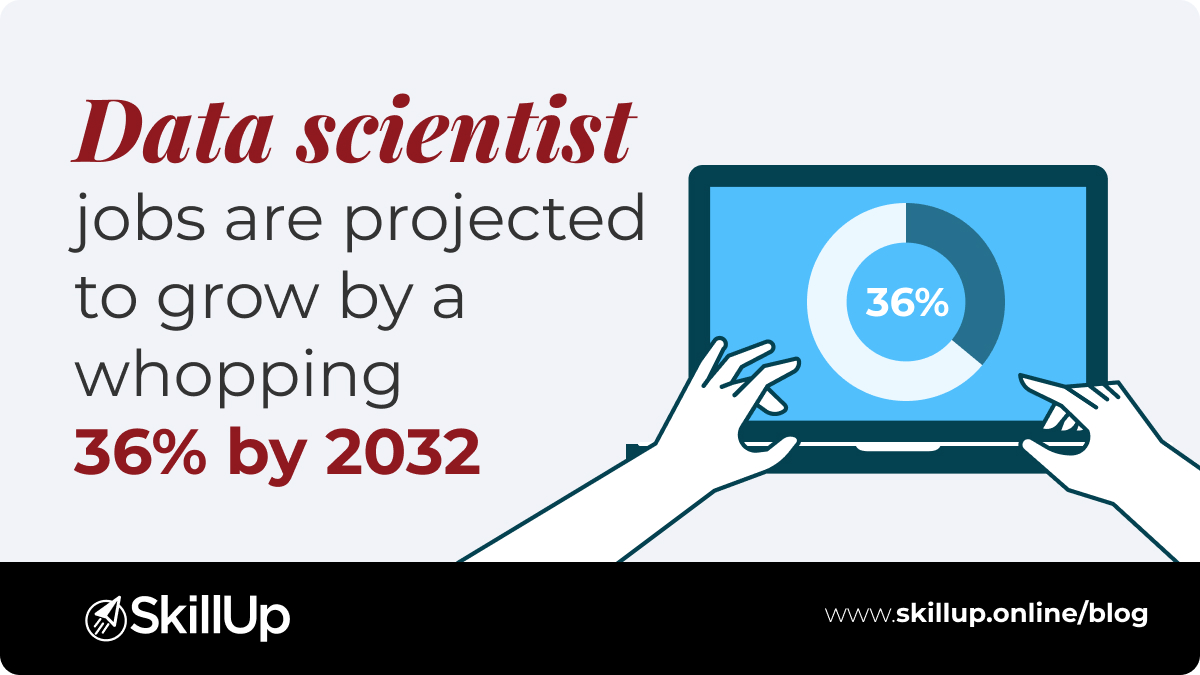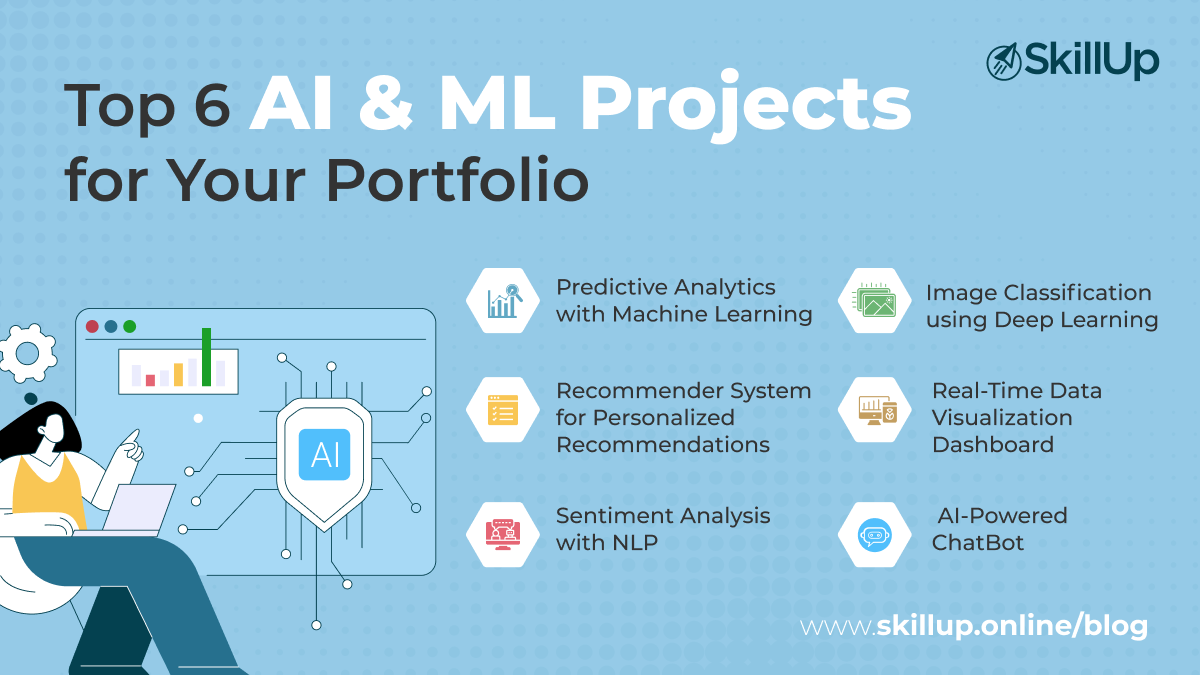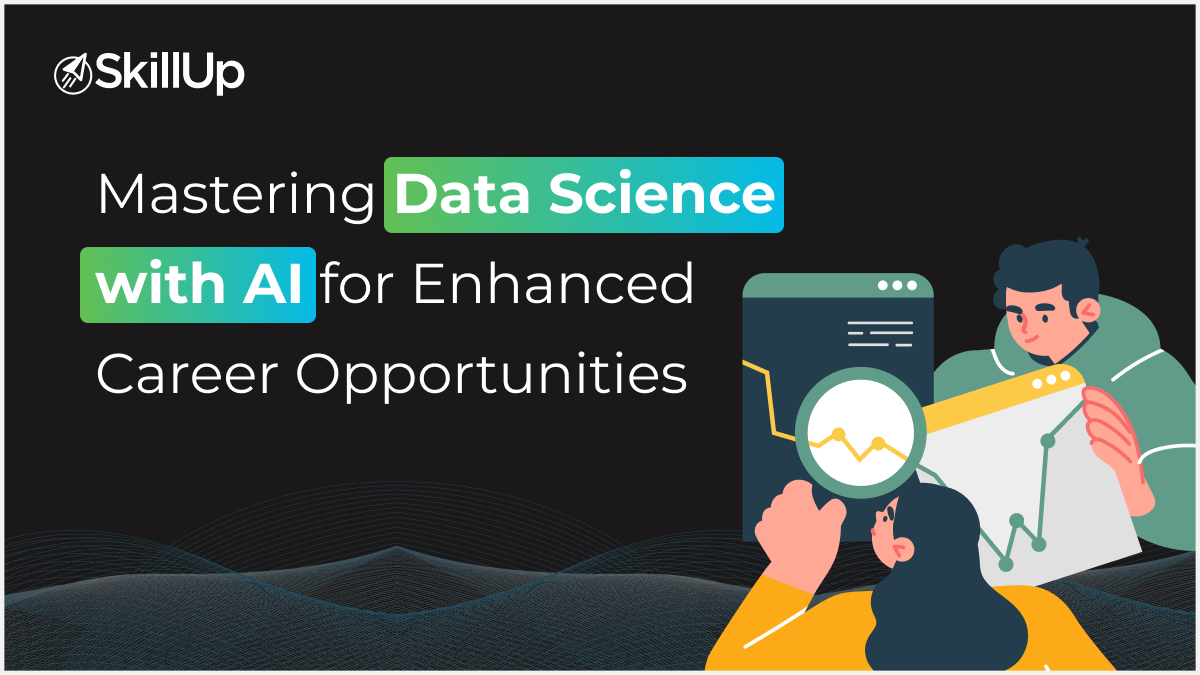In the rapidly evolving world of data science, charting a career path can be as intricate as analyzing a complex dataset. Would you prefer to build intelligent systems or drive data centric business decisions?
In this article, we will offer insights into the diverse roles within data science. We will shed light on the responsibilities and required skills to give you the knowledge you need to help you make the right informed choice.
With an average median annual salary of $135,332 for data scientists in the US, making a career in this domain is not just about fulfilling your professional aspirations but also about reaping substantial rewards.
Let’s explore the top 6 data science roles.
1. Data Scientist
- Role and Responsibility: At the core of a data scientist’s responsibilities lies the tasks of sifting through vast amounts of data, and utilizing a combination of statistical analysis, machine learning, and data mining techniques. In essence, data scientist’s extract patterns, predict trends, and offer actionable insights that drive business growth.
- Demand: In the US job market, the demand for data scientists is high. Whether they’re tech giants in Silicon Valley or startups in Austin, companies recognise the value skilled professionals bring. They bridge the gap between the technical and the non-technical, often serving as the crucial link between data and decision-makers. And, as a reflection of this value, data scientists in the US are well-compensated for their expertise. As of 2023, the average salary for a data scientist is approximately $135,332.
- Skills: Skills integral to a data scientist include proficiency in programming languages such as Python and R, a solid grounding in statistical modeling, and an innate curiosity to ask the right questions. Soft skills, such as effective communication and problem-solving, are also indispensable, particularly with respect to translating complex data findings into understandable business solutions.
So, whether you’re a budding enthusiast or a seasoned professional considering a transition, the role of a data scientist offers a challenging yet rewarding career trajectory that is ripe with opportunities to make a tangible impact.
2. Data Analyst
- Role and Responsibility: Data analysts work meticulously to gather, process, and interpret data. Their core responsibility is to transform raw numbers into meaningful narratives, assisting organizations in understanding their performance, predicting future trends, and identifying areas of improvement.
For example, consider a US e-commerce company aiming to boost holiday sales. A data analyst might sift through past sales data, customer reviews, and website traffic, to help the company target its marketing strategies more effectively or streamline its operations. - Demand: Reflecting their importance, data analysts in the US command an average salary of about $75,560 as of 2023. If you possess an analytical mindset, an eye for detail, and a passion for translating numbers into stories, the role of a data analyst is one for you.
- Skills: Essential skills for data analysts include proficiency in data visualization tools such as Tableau, expertise in SQL for database queries, and a knack for statistical analysis. But beyond these technical abilities, a data analyst’s true strength lies in their curiosity and critical thinking, allowing them to ask the right questions and uncover hidden patterns. Data analysts are invaluable assets with their ability to provide actionable insights that influence major business decisions.
3. Data Engineer
- Role and Responsibility: Data engineers lay the foundation of the data ecosystem. Their primary role is to design, construct, install, and maintain large-scale processing systems and other infrastructures. Think of them as architects and builders of data highways, ensuring that data travels seamlessly from diverse sources to its intended destinations. In the US, where companies manage petabytes of data daily, the role of a data engineer is indispensable. Whether it’s a streaming service optimizing content delivery or a financial institution ensuring real-time transaction processing, data engineers play a pivotal role. They deal with challenges like data cleaning, availability, and scalability, to ensure that data scientists and analysts can access clean, reliable data.
- Demand: Given the explosion of data-centric operations in the US, data engineers are in high demand. Their foundational work, ensuring the stability and reliability of data infrastructures, is mirrored in their compensation. As of 2023, a data engineer in the US garners an average salary of around $102,864.
- Skills: To excel in this role, a data engineer requires expertise in database systems like SQL and NoSQL, proficiency in programming languages such as Java or Python, and a deep understanding of data architecture and distributed systems.
If you enjoy solving complex problems and wish to be at the forefront of data-driven innovations, the path of a data engineer offers immense opportunities.
4. Big Data Engineer
- Role and Responsibility: Big data engineers specialize in creating solutions for storing, moving, and analyzing massive datasets. They work with technologies and frameworks like Hadoop, Spark, and Kafka, to ensure that data can be processed efficiently, irrespective of volume or velocity.
Imagine a popular social media platform in the US that deals with petabytes of user data every day, from text and images to videos and live streams. Big data engineers are specialists in designing and managing infrastructure for that data. Their work ensures efficient data ingestion, storage, and analysis. And this contributes to a smooth and responsive user experience. - Demand: Given the sheer volume of data that US businesses and services grapple with, big data engineers are vital cogs in the machinery. Their expertise ensures that organizations can make sense of their data, regardless of size. Emphasizing their pivotal role, big data engineers in the US earn an average salary of approximately $127,643 as of 2023.
For tech enthusiasts who relish challenges of scale and are eager to be at the forefront of data technology innovations, a career as a big data engineer is has a lot to offer. - Skills: Critical skills for a big data engineer include proficiency in distributed computing, expertise in big data technologies, and a deep understanding of data warehousing solutions. Their role is often collaborative, working closely with data scientists and analysts to ensure that the data infrastructure meets the analytical needs.
5. Machine Learning Engineer
- Role and Responsibility: Machine learning engineers specialize in designing, building, and deploying algorithms that enable computers to learn from and act upon data. Their work often intersects with data scientists. While data scientists focus on deriving insights, machine learning engineers emphasize the practical implementation of these insights into functional applications. Consider, for instance, the rise of autonomous vehicles in the US. These vehicles rely heavily on machine learning algorithms to interpret real-time data, make split-second decisions, and navigate our roads safely. Machine learning engineers are at the forefront of such innovations, ensuring that the algorithms powering these vehicles are robust, efficient, and adaptive.
- Demand: Recognizing the transformative potential of machine learning, US industries have seen a surge in demand for skilled engineers. Their pivotal role in advancing technology is mirrored in their compensation. As of 2023, a machine learning engineer in the US earns an average salary of approximately $140,182.
- Skills: A machine learning engineer’s skills include profound knowledge of neural networks, proficiency in programming languages like Python, and experience with machine learning frameworks such as TensorFlow or PyTorch. For those passionate about melding theoretical knowledge with practical application and envisioning a future where machines think and learn much like humans, a career as a machine learning engineer is both promising and exciting.
6. Business Intelligence Analyst
- Role and Responsibility: In a world where data drives decisions, the ability to transform this data into actionable business insights is paramount. This is where business intelligence analysts come into play, bridging the gap between raw data and tangible business strategies. Business intelligence analysts leverage software and services to convert data from various sources into a coherent narrative. They assist businesses in visualizing their operations, sales, and market trends, empowering them to make informed decisions. Their work often involves creating dashboards, generating reports, and making recommendations based on patterns and trends. For instance, a retail chain in the US might rely on a business intelligence analyst to understand which products are best-sellers during the holiday season or identify the store locations with the highest foot traffic. By interpreting sales data, customer feedback, and inventory levels, the business intelligence analyst provides insights that drive sales strategies, inventory management, and customer engagement initiatives.
- Demand: Given the competitive landscape of US businesses, the role of a business intelligence analyst is crucial. Reflecting their strategic importance, business intelligence analysts in the US are rewarded with an average salary of about $81,514 as of 2023. If you possess a blend of technical prowess and business acumen and thrive on data, a career as a business intelligence analyst is both promising and fulfilling.
- Skills: The toolkit of a business intelligence analyst typically includes expertise in business intelligence software such as QlikView, proficiency in SQL, and strong analytical skills.
Moreover, their ability to communicate complex data findings clearly and concisely to non-technical stakeholders is invaluable.
Data Scientist vs. Data Analyst vs. Data Engineer : A Comparison
In the dynamic landscape of data science, specific roles stand out prominently due to their pivotal impact on business outcomes. The roles of data scientist, data analyst, and data engineer are such notable entities. Understanding these roles’ nuances, distinctions, and convergences can guide you toward your ideal career path. Let’s dissect and contrast these roles.
Nature of Work:
- Data Analyst: As data detectives, data analysts dissect existing data to draw insights. They assist organizations in decision-making by visualizing data patterns, identifying anomalies, and generating comprehensive reports.
- Data Engineer: The role can be visualized as the architects and builders of data infrastructures. Their prime responsibility is to design, construct, and maintain the pipelines and systems that make data accessible, consistent, and scalable.
- Data Scientist: data scientists are the explorers of the data realm. Their journey involves diving into datasets, extracting insights, predicting future trends, and crafting machine-learning models. Their approach is investigative and often borders on experimental research.
Key Skills:
- Data Analyst: Their toolkit includes a strong analytical mindset, expertise in SQL, mastery over data visualization platforms like Tableau or Power BI, and adeptness in statistical analyses.
- Data Engineer: Their proficiency spans distributed computing environments, diverse database systems (SQL or NoSQL), and an intimate familiarity with big data platforms like Hadoop and Spark.
- Data Scientist: Essential skills encompass machine learning techniques, statistical modeling prowess, fluency in programming languages like Python and R, and a knack for data visualization tools.
Impact:
- Data Analyst: Their ability to morph raw data into actionable insights empowers businesses to fine-tune their operational strategies and foster informed decision-making.
- Data Engineer: By ensuring an uninterrupted data flow and maintaining its integrity, they set the stage for all subsequent data-driven endeavors.
- Data Scientist: By steering innovation, developing predictive frameworks, and providing deep-seated data analyses, they play a central role in shaping data-driven business strategies.
Navigating this triad of roles boils down to aligning with personal inclinations. If machine learning and research driven exploration interest you, the path of a data scientist might be your calling. The data analyst role is ideal if decoding stories hidden within data fascinates you. And for those passionate about crafting robust data infrastructures, the journey of a data engineer promises rich rewards.
Specializations in Data Science
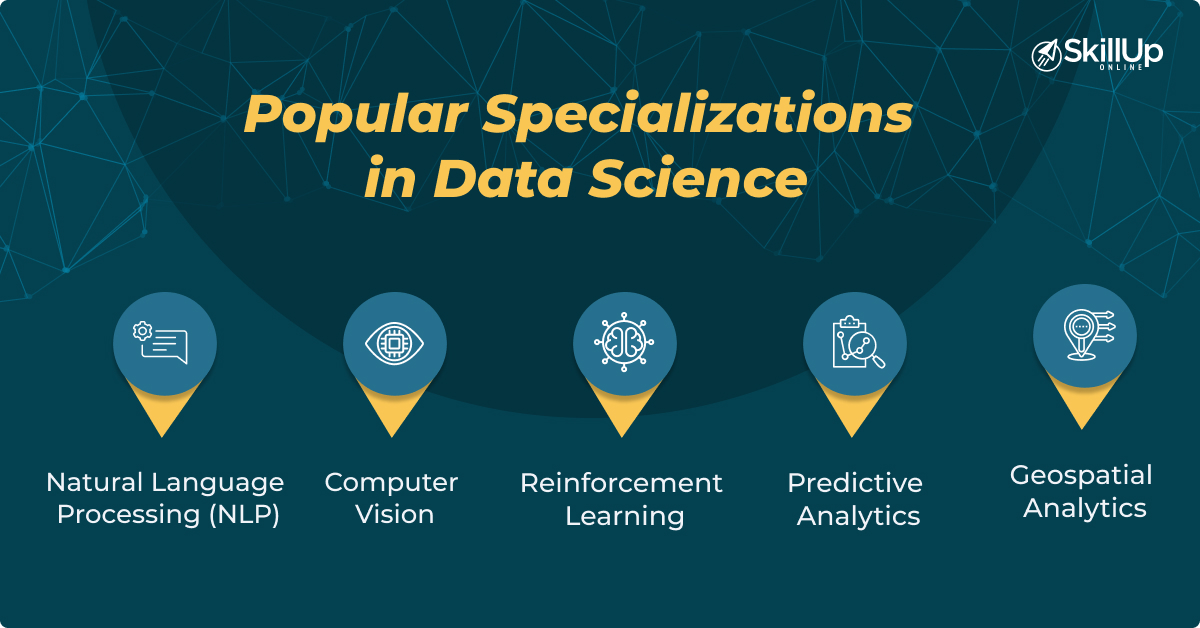 The data science domain, vast and varied as it is, offers an array of specializations catering to diverse interests and aspirations. As the demand for tailored data solutions grows in the US market, so does the need for specialists in niche areas. Let’s explore some of these specializations:
The data science domain, vast and varied as it is, offers an array of specializations catering to diverse interests and aspirations. As the demand for tailored data solutions grows in the US market, so does the need for specialists in niche areas. Let’s explore some of these specializations:
1. Natural Language Processing (NLP): Centered around enabling machines to understand and interpret human language, NLP specialists work on chatbots, voice assistants, and sentiment analysis tools. Their work powers everything from customer service bots to real-time translation applications.
2. Computer Vision: This specialization focuses on equipping machines with the ability to interpret visual information from the world, akin to human vision. Computer vision experts work on facial recognition systems, augmented reality apps, and medical imaging technologies.
3. Reinforcement Learning: Here, specialists work on algorithms that allow machines to learn through trial and error, refining their actions based on rewards. This field underpins advancements in game AI, robotics, and specific financial models.
4. Predictive Analytics: Experts in this area focus on specializing in forecasting future events based on past data. Their influence is vast, from predicting stock market trends to e-commerce product recommendations.
5. Geospatial Analytics: Specialists in this area analyze location-based data, aiding sectors like urban planning, disaster response, and transportation.
The opportunities for professionals in the US contemplating a niche specialization are both abundant and rewarding. For instance, with the rise of voice-activated systems and AI-driven customer support, NLP specialists find themselves in high demand. Glassdoor suggests that NLP specialists in the US can expect an average salary upward of $99,811.
Choosing a specialization is about aligning your passions with market demand. Whether it’s making machines ‘see’ or ‘speak’ or predicting the future based on data trails of the past, your passions can be aligned with what the market wants.
Starting Your Career Journey
Embarking on a data science career in the US can be both exhilarating and daunting. The domain is vast, the opportunities plentiful, but the path can sometimes seem confusing.
Here’s a roadmap to initiate your journey.
1. Foundational Knowledge: Begin with the basics. Acquaint yourself with fundamental concepts of statistics, linear algebra, and calculus. These mathematical foundations are pivotal for any data science role. To cement these basics, platforms like SkillUp Online offer online IT courses such as Foundation of Artificial Intelligence and Machine Learning.
2. Programming Skills: Data science demands proficiency in languages like Python and R. We would recommend that you start with Python, given its versatility and rich library ecosystem. Consider courses like Python for AI and Development Project for a head start.
3. Practical Experience: Theory without practice is like a car without fuel. Engage in real-world projects, participate in data science competitions, or contribute to open-source endeavors. This hands-on approach enhances your skills and makes your resume stand out.
4. Continuous Learning: The data science field is ever-evolving. Stay updated with the latest trends, tools, and techniques. Periodic certifications, like the IBM Applied AI Professional Certificate, can propel you ahead in the competitive landscape.
5. Soft Skills: Beyond technical prowess, cultivate skills like effective communication, critical thinking, and teamwork. Remember, data science isn’t just about algorithms; it’s about deriving actionable insights and communicating them to stakeholders.
6. Networking: Forge connections with professionals in the field. Attend data science meetups, webinars, and conferences. Networking can often open doors to opportunities and collaborations you hadn’t anticipated.
Remember, every data science enthusiast’s journey is unique. Your interests and aspirations will shape your path and the choices you make along the way. And while the journey may be challenging, the rewards – in terms of personal growth, professional development, and compensation – are substantial.
The data science landscape is as vast and varied as it is promising. Each role, from data scientist and data analyst to prominent data engineer, plays a distinct part in this intricate ecosystem. As the US increasingly pivots towards a data-driven economy, the opportunities in this domain multiply. This provides you with diverse avenues to make your mark in the field of data science.
 If you would like to know more about how you can build the necessary skills and get started in data science, contact our Learner Support Team at [email protected]. They will be more than happy to guide you on your next steps
If you would like to know more about how you can build the necessary skills and get started in data science, contact our Learner Support Team at [email protected]. They will be more than happy to guide you on your next steps
SkillUp Online
